On August 31, 2025, the World Bank announced a $20 billion concessional loan to Pakistan, to be disbursed over a ten-year period at an interest rate of 2%. This loan is part of the Country Partnership Framework (CPF) for 2025–2035, which aims to address Pakistan’s development challenges. Additionally, the International Finance Corporation (IFC) may mobilise another $20 billion for private sector investment, bringing the total funding to $40 billion.
The World Bank’s $20 billion loan, channelled through its International Development Association (IDA), supports Pakistan’s long-term growth. With a low 2% interest rate, the loan targets six key sectors: climate resilience, poverty reduction, improvements in health and education, reduction of child stunting, inclusive development, and adoption of clean energy. Additionally, the IFC will facilitate private sector funding to boost economic growth. According to Reuters, annual disbursements are expected to range from $1.5 billion to $2 billion, contingent on Pakistan’s performance and funding availability.
The CPF emphasises sustainable development by prioritising upgrades in infrastructure, particularly in areas such as education, sanitation, and disaster resilience. The plan also seeks to boost private investment and promote inclusive growth. By addressing issues such as child stunting and air quality, this framework aligns with Pakistan’s strategy for economic revival.
Asian Development Bank’s Flood Relief Support
The Asian Development Bank (ADB) has pledged $3 million in emergency aid for regions in Pakistan affected by flooding. ADB President Masatsugu Asakawa expressed condolences for the more than 800 lives lost since June 2025. This grant, which comes from the Asia Pacific Disaster Response Fund, is in response to Pakistan’s request for urgent relief to support flood-hit communities in Punjab and other areas.
Pakistan faces significant economic challenges, with an external debt of $131.1 billion. To meet the International Monetary Fund’s (IMF) conditions, the government plans to extend domestic debt maturities from 3 years and 8 months to 52 months and external debt from 6.1 years to 76 months. This strategy aims to ease repayment pressures while leveraging the World Bank loan for development. The loan complements Pakistan’s $7 billion IMF bailout.
The $20 billion loan provides crucial support for Pakistan’s economy, which has been severely impacted by recent floods and high inflation. This funding will bolster infrastructure to address climate risks, particularly those that became significant in the aftermath of the devastating floods of 2025. Additionally, private sector funding from the International Finance Corporation (IFC) has the potential to create jobs and foster innovation. However, it is essential for Pakistan to implement reforms to ensure that the funds are utilised effectively, as highlighted by World Bank Country Director Najy Benhassine.






